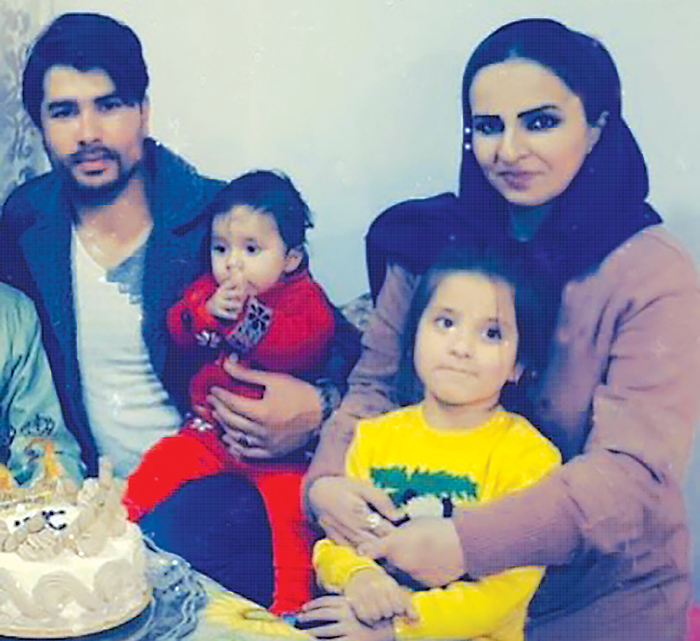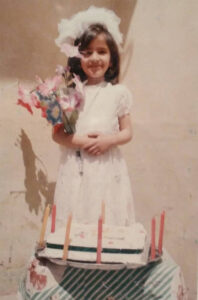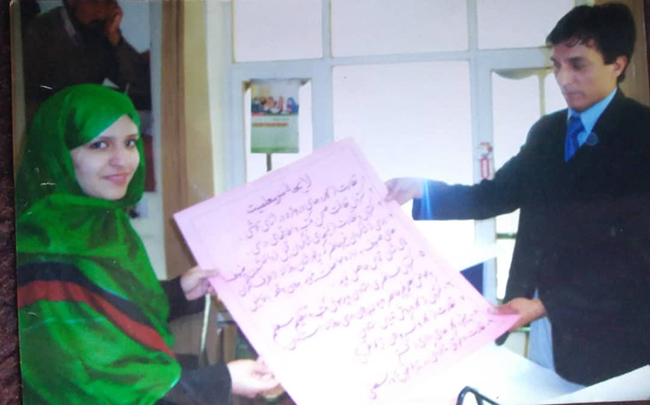Nabila’s journey, part I: ‘A woman’s place’

By Nabila Painda | Special to the Courier
You might have read the story of Malala Yousafzai, the Pakistani activist and winner of the 2014 Nobel Peace Prize. In my country of Afghanistan there are thousands of Malalas — women who risked or even sacrificed their lives for education — yet their voices have never reached the world. These women, myself included, struggled for their rights, but the world doesn’t know us. I feel it’s my duty to convey these truths to you.
In 1996 the Taliban seized control of the Afghan government for the first time. They imposed their will on the fate of Afghan women and girls, marking the beginning of a dark and unforgivable history. Though I was just 8 years old and in the second grade, I could no longer go to school because the Taliban had eliminated education for girls.
I was deeply affected. I would wake up in tears, pleading with my parents to take me to school. They provided comfort and tried to create a classroom environment for me at home, but I remained unsatisfied. It was then that my determined mother and several other women decided to secretly establish an underground school for girls.
They rented a basement of a house, and began. After a few weeks, I found joy in going there. One day, the landlord hurriedly approached my mother and said something. My mother screamed, “Hurry, escape through the back, and get yourselves home quickly.” She took my hand, and we waited until everyone left before going outside.

Seven-year-old Nabila Painda in Afghanistan in 1995. Photo/courtesy of Nabila Painda
In that moment, the sound of gunfire echoed everywhere. My mother collapsed to the ground, blood pouring from her heart. Just a few steps away, my dear friend was also on the ground. In a rush, some people threw them into a car and took them to the hospital. One of the men who remained was familiar to me; he grabbed my hand. Amid my desperate cries, he brought me home and informed my father that the Taliban had attacked them after learning about the girl’s school.
I believed my mother was dead and could only cry.
The bullet had entered her left arm and exited through her shoulder. My mother was hospitalized for 20 days. The day she returned home was the happiest moment of my life.
After that, our family — I am the seventh and youngest child, with a 25 year age difference between my oldest sibling — decided we needed to leave Afghanistan because it was no longer safe for us. Thus, our migration story began.
We rented a house in Peshawar, Pakistan in late 1996. My niece and I enrolled in school, and each of us took on various responsibilities. We faced numerous challenges, but my young mind couldn’t fully comprehend them amidst the struggles. We spent five years there.
Later, with the military intervention of the United States and an international coalition, the Taliban was removed from power in Afghanistan. An interim government, led by Hamid Karzai, was established in December 2001. Feeling assured of the presence of the United States in Kabul and the security it provided, we returned to Afghanistan.
I entered the seventh grade and continued taking private classes in English and mathematics. I enjoyed life and was busy preparing for the exams that would be taken after the 12th grade, leading to admission to government universities for successful candidates.
Upon completing the 12th grade I was hired as a deputy teacher at a private school called Pamir Private High School. I quickly progressed from a low salary to the ranks of a teacher, head teacher, and eventually school principal. Later, I served as a director in other schools.

The principal of Pamir Private High School promotes Nabila Painda to head teacher in 2011. Photo/courtesy of Nabila Painda
Simultaneously, I collaborated with a company my mother had established, Medina Maryam Handicrafts, initially as a deputy. When my mother retired, I took over as the company’s president and my mother became the deputy.
We worked with women who had never attended school, including some who had not been allowed to leave their homes. They were unaware of their rights, and lacked skills beyond household chores. Our goal was to educate them to the best of our ability. We aimed to raise awareness about their family and social rights, and provide them with the means to access these rights. We also provided training in various handicraft sectors, paving the way for them to enter the workforce. We showcased their handmade products in domestic and international markets, hoping to sell and promote their craftsmanship. Many eventually joined schools and later, universities.
Over the 20 years I spent working with these women, I faced threats, was pursued, and received numerous warning letters, but I never gave up the fight. But sadly, history repeated itself: on August 14, 2021 I was on my way to work when a man dressed in the garb of a Taliban member stood in front of me and shouted, “If you don’t want to die, go back home; a woman’s place is at home.”
Upland resident Nabila Painda is a Claremont Unified School District para educator and native of Afghanistan, where she was a high school principal.
Part II of Nabila’s journey, “Don’t open the door for anyone,” will be published in next week’s edition.







0 Comments